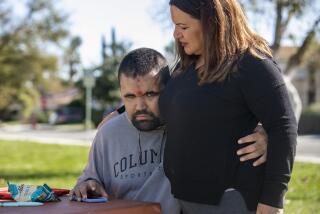Slain Boy Had Troublesome Last Months
- Share via
Rodney Haynes was devoted to “Mama,” his foster mother who had raised the boy since he came into her life, a small, wiggly 8-month-old whose father was dead and whose birth mother couldn’t care for him.
They were together until January, when Doris Cross--the only mother Rodney ever knew--died at 75. He was 11.
It was then, say Linda Smith and Diedra Lampley, his guardians, that Rodney changed. He got into trouble. He skipped school. He was sent to Juvenile Hall and, most recently, to a group home.
Now, Smith and Lampley are trying to understand how the 12-year-old boy could have ended up slain, found beaten to death Wednesday and left in a trash bin near that Calabasas home. Two teenagers, ages 17 and 16, who lived with Rodney in the same home for troubled youths, were charged with murder Friday in the boy’s death. Police said they beat him to death with a stick and rock.
Rodney hadn’t even been at Passageway, a group home for troubled boys, a full week when he was killed.
Several agencies were investigating the circumstances of Rodney’s placement in the home and his death, including the California Department of Social Services, the Los Angeles County Probation Department, and the office of Supervisor Zev Yaroslavsky.
On Friday, Rodney’s guardians, both daughters of “Mama” Cross, were planning the funeral. They hope to bury the boy near his foster mother.
“I want him as close as I can get him to her,” Lampley said. “He just felt so abandoned by her death. . . . I want them to be together.”
The women last saw Rodney at a court placement hearing Aug. 15. They attempted to locate him Tuesday, but authorities did not return their calls, they said.
Until Thursday. Two probation department officials showed up at their Compton home and informed them that Rodney was dead.
“I’m still a nervous wreck,” Smith said. “He’s been in this house since he was a baby. This is the only home he ever knew. What happened to him?”
Smith criticized Haynes’ placement at Passageway. “A 12-year-old has no business being with a 17-year-old,” she said.
The home’s founder, Andrew Juels, did not return phone calls.
Joe Estrada, director of placement services for the Los Angeles County Probation Department, said state guidelines on placement focus on the severity of the offense and the needs of the offender, rather than on age. The agency contracted with Passageway for its services and placed Haynes in the home.
The boy’s other guardian, Lampley, contended that “Rodney wasn’t a bad kid, maybe just a confused kid.”
Small for his age, his guardians say he was maybe 4-foot, 10-inches tall and not even 85 pounds. Police say one of his assailants weighed 200 pounds. They say Rodney was outgoing and outspoken; good at sports but slow in school.
Recently, he was given a psychological evaluation in which it was discovered that he had a learning disability. At that time, Lampley said, he told the psychologist: “It didn’t matter what he did or what happened, my mother would always be there to protect him.
“The problems seemed to mount for him after my mom died,” Lampley said. “Everything escalated.”
To help Rodney, Lampley said, she would bring him to her work at Beyond Shelter, which helps families and single mothers who are at risk of being homeless. There, counselors and others would talk to the boy, coaxing him to attend classes and take the right path.
But in the last eight months of his short life, Rodney was testing the limits, Smith and Lampley say.
He began to hang out with the wrong crowd: The day before he turned 12, Rodney was arrested for robbery along with three other people. Police told the women that Rodney was the lookout and that the others robbed a Compton video store.
He spent a month in Juvenile Hall, came home on probation but began to skip school. He ran away but was found a few days later.
As a result, authorities told Smith and Lampley that he would be sent to a group home where he could be supervised 24 hours a day and receive counseling. They agreed, believing he would return home to Compton in a couple of months.
Now, they question the system. How could a 12-year-old boy end up with much older boys?
“I just can’t understand this,” Smith said. “It’s a puzzle that needs to be solved.”
Moreover, Smith says she wants to know what could have led teenagers to murder. “What did he do?” she asked. “What was so bad that he had to be beaten and put in a trash can?”
Authorities say the boys left Passageway together. From there, the story is murky. Police say the teenagers admitted killing the younger boy because he was a smart-aleck and mouthy.
It was Rodney’s second group home in two weeks. He was taken out of the first one, the guardians say, because he didn’t like it. Another source said he was removed because he was older than the others and was “acting out” too much.
Either way, Rodney ended up at Passageway in Calabasas.
He didn’t appear worried about going to a group home, his guardians say, because he knew he had come home to Compton.
“He knew he was only going for a while. . . . He seemed fine about it,” Smith said. “Rodney was a good kid. He didn’t deserve to die.”
Staff writers Ann W. O’Neill, Andrew Blankstein and Jose Cardenas contributed to this story.
More to Read
Sign up for Essential California
The most important California stories and recommendations in your inbox every morning.
You may occasionally receive promotional content from the Los Angeles Times.










